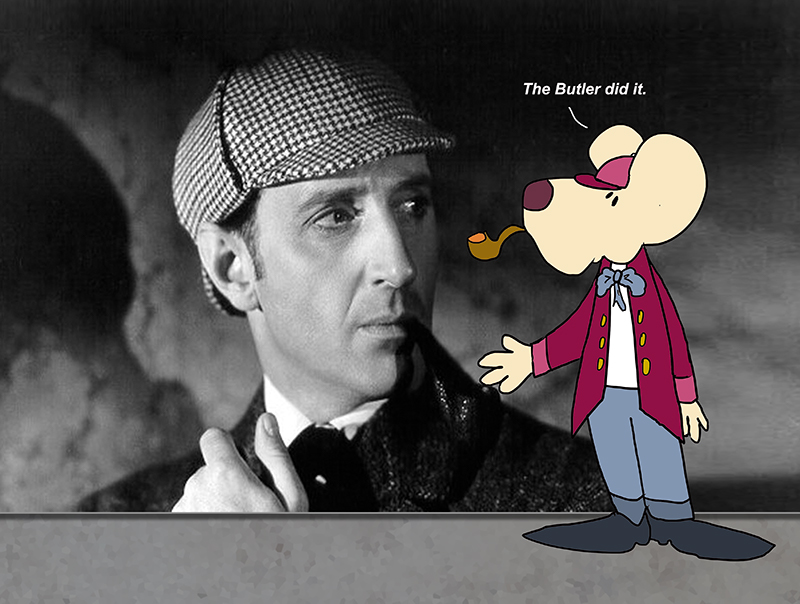“You see, but you do not observe.”
These, the words of Sir Arthur Conan Doyle, whose birthday falls on this date, May 22, 1859. We all know him as the splendid author and creator of Sherlock Holmes, the greatest detective in all of history.
To be completely honest here, I have never read a Sherlock Holmes book, but I certainly have seen the movies throughout my life. Some of my favorites were the early Sherlock Holmes capers, starring Basil Rathbone as Holmes and Nigel Bruce as Watson. The Hound of the Baskervilles was astounding to me when I was a child.
Sir Arthur Conan Doyle started out as a child too. As mentioned, he was born in 1859 in Scotland. This surprised me, as I always thought he was English. Regardless, his father, Charles Altamont Doyle, was born in England, an Irish Catholic, and his mother, Mary (née Foley), was Irish Catholic too.
When young Arthur was five years old, the family scattered because his father was a troublesome alcoholic. Because of this problem, the children were temporarily housed across Edinburgh. Most likely, they were completely broke. Young Arthur lodged with a woman named Mary Burton, the aunt of a friend.
Three years later, in 1867, the family came together again and lived in squalid tenement flats at 3 Sciennes Place. I don’t know how much longer the family stayed together because, beginning at an early age and all throughout his life, Doyle wrote letters to his mother. Apparently, many of them were preserved and still exist today.
Thankfully, for little Arthur, he was supported by wealthy uncles. I do not know if these uncles were maternal or paternal, but they made a point to have him educated. He was sent to England to a Jesuit preparatory school at the age of nine (1868–70). He then went on to Stonyhurst College, which he attended until 1875.
His time at Stonyhurst made a mark on him. He was not unhappy there, but he didn’t have a lot of nice things to say about it either. Doyle said the school was “run on medieval principles: the only subjects covered were rudiments, rhetoric, Euclidean geometry, algebra, and the classics.”
He continued with his comments, saying that this academic system could only be excused “on the plea that any exercise, however stupid in itself, forms a sort of mental dumbbell by which one can improve one’s mind.” He also complained of their corporal punishment.
From 1875 to 1876, he went to a Jesuit school in Austria. Those rich uncles wanted him to spend a year perfecting his German. However, while he was there, he made the decision to reject the Catholic faith. He became an agnostic. It wasn’t long after that he became involved in the study of spiritualistic mysticism.
Yes, Sir Arthur Conan Doyle was highly involved with the knowledge and advancement of the nether world. Spiritualism. Mysticism. The Beyond.
I can’t possibly list all his involvements over the years because they are so numerous.
In 1887, Doyle began a series of investigations into the possibility of psychic phenomena. He was rigorous in his work, attending about 20 seances, as well as experiments in telepathy and sittings with mediums.
Writing to a spiritualist journal “Light” that year, he declared himself to be a Spiritualist. In his writings to them, he described one particular event that had convinced him psychic phenomena were real.
Starting in 1889, he became a founding member of several societies for Psychical Research, and his pursuits continued to mount over the years.
In 1916, Doyle’s belief in all of this was strengthened by what he took to be the psychic abilities of his children’s nanny, Lily Loder Symonds.
He wrote about Spiritualism often, along with so many other topics, including the most famous Sherlock Holmes. And this short piece only offers a small glimpse into the complexity of Sir Arthur Conan Doyle. As he said, “You see, but you do not observe.”
==========
“The possession of knowledge does not kill the sense of wonder and mystery. There is always more mystery.”
― Anais Nin
=========
“Don’t judge a book by its cover”
― George Eliot, The Mill on the Floss
===========
“As a rule, the more bizarre a thing is the less mysterious it proves to be. It is your commonplace, featureless crimes which are really puzzling, just as a commonplace face is the most difficult to identify.”
― Arthur Conan Doyle, The Adventures of Sherlock Holmes
==========
Elementary, he said. But is it?
